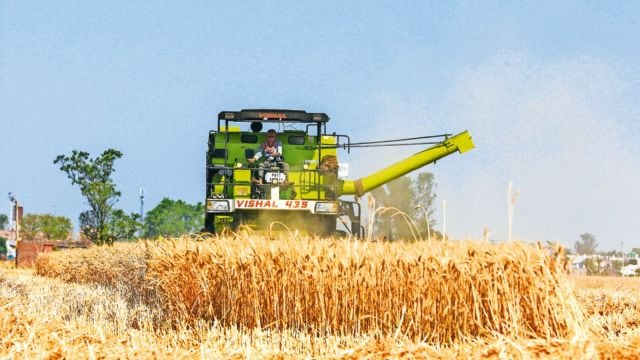Escalating Indo-Pak tensions are spurring farmers in Jammu’s border villages to wrap up harvest and ready bunkers
In Jammu, India shares a 221 km long international border with Pakistan from Kathua district to Kanachak in Jammu. Meanwhile, the LoC that starts from Jammu’s Akhnoor sector and goes into Rajouri, Poonch and finally, into Kashmir Valley is 744 km long.
 Farmers harvest wheat crop near the International Border in Jammu, Saturday, April 26, 2025. Harvesting is done little early due to prevailing tension following the Pahalgam terror attack. (PTI Photo)
Farmers harvest wheat crop near the International Border in Jammu, Saturday, April 26, 2025. Harvesting is done little early due to prevailing tension following the Pahalgam terror attack. (PTI Photo) Ever since the Pahalgam attack this week, Sandeep Saini has been anxious to harvest his standing wheat crop near the barbed wire fence in Samba district’s Ramgarh area. Tensions on the Indo-Pak borders are escalating, the farmers like Saini, a former Panch, want to finish their work and then clean out the underground bunkers in their houses – just in case.
“Though the incidents of ceasefire violation along the international border and the Line of Control have not been much since 2021, we have decided to have our bunkers in ready-to-use condition in view of the growing tension between two neighbours after the Pahalgam attack,” he tells The Indian Express.
Saini’s anxiety is echoed throughout the Jammu border. This week, 26 people – mostly tourists but also a pony ride operator — were shot dead by some terrorists in Pahalgam. The attack, and the following tensions between the two countries, have led farmers along the border — from Kathua district to Kanachak area in Jammu – to hurry along their harvest and clean out the 15,000 underground bunkers built by the central government between 2018 and last year in Jammu’s border villages at the cost of Rs 415 crore.
In Jammu, India shares a 221 km long international border with Pakistan from Kathua district to Kanachak in Jammu. Meanwhile, the Line of Control that starts from Jammu’s Akhnoor sector and goes into Rajouri, Poonch and finally, into Kashmir Valley is 744 km long.
Although harvest season frequently gets prolonged in these parts, mostly due to the lack of sufficient agricultural labour, the tensions between the two countries have made farmers along both the international border as well as the LoC aim to finish the job sooner.
“It is one’s own interest to be prepared for any exigency,” one such farmer in Suchetgarh in RS Pura says. “With the tensions, who knows when situation turns explosive and leads to more firing and shelling”.
For Sureshta Devi in Jammu’s Marh block, memories of the 2017 escalation, when some mortar shells that fell on her house caused deep cracks, are still fresh in her mind. Over 30 people had died across J&K and more than 4,500 left their homes along the Line of Control and moved to relief camps set up in Nowshera during that time.
Likewise, 60 civilians and security forces personnel had died in cross border firing and shelling in 2018. Although the ceasefire agreement between India and Pakistan has meant a decline in the number of cross-border firing, residents here are unwilling to take a chance.
“It is better to get our underground bunkers ready, just in case there’s shelling from across the border,” Balbir Kour, a former sarpanch in R S Pura sector, says.







